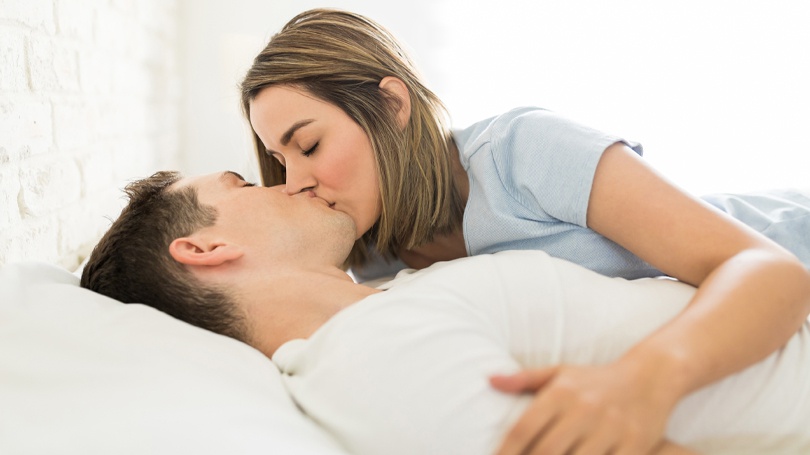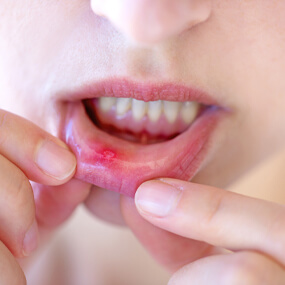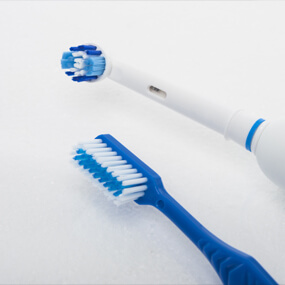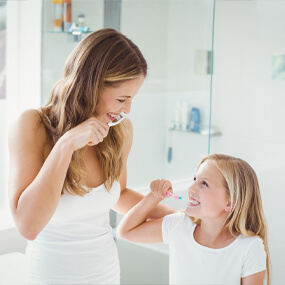Can Kissing Affect Your Oral Health for Better or Worse?

Kissing the ones we love is among the most natural expressions of affection. Kisses can be romantic but shared with our children and friends and even used as a greeting. An amorous kiss—which the French call a lover’s kiss and is more crudely referred to as swapping spit—is actually the intertwining of two oral microbiomes. In fact, one study—Shaping the Oral Microbiota Through Intimate Kissing—found that a 10-second kiss can transfer as many as 80 million bacteria and that couples who kiss each other at least nine times a day tend to have a similar microbiome! Kissing also releases endorphins, burns calories, exercises your facial muscles, releases tension, and boosts your immune system.
Kisses: A Biological Exchange
The aforementioned study was conducted by Dutch scientists and published in the journal Microbiome. The researchers discussed how the human mouth can be more home to more than 700 varieties of bacteria and that the people closest to us tend to shape those communities. Your oral bacteria exist not just on your tongue and in your spit but on your teeth, lips, and cheeks. Therefore, even non-amorous kissing can lead to an exchange of biological data, and such bacteria can be both good and bad.
Kisses: The Oral Health Benefits
Some people may get a bit squeamish thinking about how a kiss is an exchange of saliva and bacteria, but there is real health value within such exchanges. Kissing promotes saliva flow, and saliva is essential to keeping the mouth moist and washing away food particles, bacteria, and acid. Your saliva also contains agents that can inhibit bacterial growth as well as the formation of plaque. There are organisms in saliva that help prevent fungal infections, such as oral thrush, and stop the growth of streptococcus mutans, which is a bacterium that is among the leading causes of tooth decay.
Your mouth is an integral aspect of your immune system and is often referred to as the window to systemic health. Kissing exposes you to new bacteria and thus makes your oral microbiome more robust. This makes you more resistant to infections, viruses, diseases, and so forth.
Kisses: The Oral Health Risks
Not all oral bacteria are good for you, and an exchange of bad bacteria can make your mouth less healthy. If your partner has periodontal disease, for instance, the bacteria associated with that disease will be transferred to your mouth and can make you more prone to oral health issues. A person with poor oral health is likely to transfer bacteria that introduce acids, which can result in bad breath and eventually lead to tooth decay. So, while kissing can diversify and strengthen your oral microbiome, kissing many different strangers would likely undermine your oral health overall.
Your oral health risk, however, extends beyond bacteria that cause bad breath and tooth decay. Kissing is among the fastest and most effective ways to transfer infectious microbes. These microbes include bacteria, fungi, protozoa, and viruses and can spread through your saliva. The Academy of General Dentistry warns that you can share more than 500 disease-causing microbes with just a single kiss! Some of the illnesses that are commonly transferred between kissing partners include:
- The Common Cold—Upper respiratory tract infections are caused by a wide range of viruses. You can easily spread your cold to another or vice versa through simple contact with a cold virus.
- Mono—Infectious mononucleosis, which is also known as glandular fever and the kissing disease, is an infection caused by the Epstein–Barr virus. It can cause fever, a sore throat, and swollen glands.
- Herpes infection—Epstein-Barr is just one virus in the herpes family. There are many others, such as herpes simplex, which causes cold sores, and varicella-zoster, which causes chickenpox.
- Hepatitis B—HB is an infectious disease that affects the liver. It is most commonly transmitted through blood, but saliva does carry the HB virus and can infect another.
- Meningococcal disease—This disease is a potentially fatal condition that involves acute inflammation of the membranes surrounding the brain and spinal cord. Studies have shown that this disease can usually only be transmitted through deep kissing.
- Warts—Warts are transferable through kissing, especially when the trauma is recent.
How to Kiss in Good Health
Kissing can have both a positive and negative impact on your oral health. There are, however, some practices that you can embrace in order to mitigate the downsides.
- Be particular. Ideally, you should know something about a person’s oral health and overall health before you kiss them. Be aware that having multiple sexual partners increases your risk.
- Bad breath happens to us all on occasion. But be wary when meeting someone new, or the halitosis seems frequent. It can indicate gum disease or tooth decay, which are both transmittable.
- Never kiss anyone when you or they are sick or have sores on the mouth.
- Be diligent with your oral care. Brush and floss twice a day without fail. Be sure to visit your dentist twice a year to have your oral health examined and your teeth professionally cleaned.
- Drink plenty of water. Not only is it great for your overall health, but it helps to avoid bad breath and washes away the food particles, bacteria, and acid that can lead to tooth decay and gum disease.
- Need a breath freshener? Sugar-free xylitol gum is an excellent option. It helps avoid dry mouth, lowers acid levels in the mouth, and makes it more difficult for bacteria to adhere to your teeth.
- Avoid kissing babies on the lips. The bacteria linked to tooth decay is not naturally occurring in newborns. It must be introduced, and you can inadvertently do that with a kiss on the lips.
Kiss With Confidence
Kiss your loved ones with confidence by ensuring the healthiest mouth possible. Great oral health starts at home with diligent oral hygiene. You should also visit Jeffrey D. Clark, DDS, every six months to receive a comprehensive dental checkup and to have your teeth cleaned by an oral hygienist. Call Scottsdale Cosmetic Dentistry Excellence at 480 585 1853 to schedule your next checkup with Dr. Clark.




